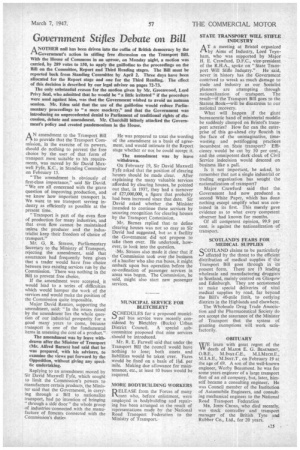Government Stifles Debate on Bill A NOTHER nail has been driven
Page 27

If you've noticed an error in this article please click here to report it so we can fix it.
into the coffin of British democracy by the Government's action in stifling free discussion on the Transport Bill. With the House of Commons in an uproar, on Monday night, a motion was carried, by 289 votes to 150, to apply the guillotine to the proceedings on the Bill on the Committee, Report and Third Reading stages. The Bill must be reported back from Standing Committee by April 2. Three days have been allocated for the Report stage and one for the Third Reading. The effect of this decision is described by our legal adviser on pages 72-73.
The only substantial reason for the motion given by Mr. Greenwood, Lord Privy Seal, who admitted that he would be "a little irritated" if the procedure were used against him, was that the Government wished to avoid an autumn session. Mr. Eden said that the use of the guillotine would reduce Parliamentary proceedings to "a mere mockery," and that the Government was introducing an unprecedented denial to Parliament of traditional rights of discussion, debate and amendment. Mr. Churchill bitterly attacked the Government's policy and created pandemonium in the House.
AN amendment to the Transport Bill to provide that the Transport Commission, in the exercise of its powers, should do nothing to prevent the free choice by the user of that form of transport most suitable to his requirements, was moved by Sir David Maxwell Fyfe, K.C., in Standing Committee" on February 13.
"The amendment is obviously of first-class importance," said Sir David. "We are all concerned with the grave question of improving production, and we know how important transport is. We want to see transport serving industry as efficiently as possible at the present time.
"Transport is part of the even flow of production for many industries, and that even flow cannot be maintained unless the producer and the industrialist keep their freedom of choice of transport."
Mr. G. R. Strauss, Parliamentary Secretary to the Ministry of Transport, rejecting the amendment, said that assurances had frequently been given that a trader would have free choice between two existing services run by the Commission. " There was nothing in the Bill to prevent free choice.
If the amendment were accepted, it would lead to a series of difficulties which would hamper the work of the services and would make the position of the Commission quite impossible.
Major David Renton. supporting the amendment, said: "in the issues raised by the amendment lies the whole ques tion of our industrial prosperity for a good many years to come, because transport is one of the fundamental items in assessing the cost of a product."
The amendment was by leave withdrawn after the Minister of Transport (Mr. Alfred Barnes) had said that he was prepared, with his advisers, to examine the views put forward by the Opposition, without giving any specific undertaking.
Replying to an amendment moved by Sir David Maxwell Fyfe, which sought to limit the Commission's powers to manufacture certain products, the Minister said that the Government, in carrying through a Bill to nationalize transport, had no intention of bringing " through a side door" the whole group of industries connected with the manufacture of fitments connected with the Commission's duties He was prepared to treat the wording of the amendment as a basis of agreement, and would intimate at the Report stage whether or not he could accept it. The amendment was by leave withdrawn.
On February 19, Sir David Maxwell Fyfe asked that the position of clearing houses should be made clear. After explaining the many valuable services afforded by clearing houses, he pointed out that, in 1937, they had a turnover of £27,000,000, a figure that probably had been increased since that date. Sir David asked whether the Minister intended to continue these services by securing recognition for clearing houses by the Transport Commission.
Mr. Barnes replied that to define clearing houses was not so easy as Sir David had suggested, but as a facility the Government did not propose to take them over. He undertook, however, to look into the question.
sMr. Strauss also made it clear that if the Commission took over the business of a hardier who also ran buses, it might embark upon bus operation before the co-ordination of passenger services in areas was begun. The Commission, he said, might also start new passenger services.
MUNICIPAL SERVICE FOR BLETCHLEY?
SCHEDULES for a proposed munieipal bus service were recently considered by Bletchley (Bucks) Urban District Council. A special subcommittee proposed that nine services should be introduced.
Mr. R. E. Farwell said that under the Transport Bill the council would have nothing to lose; both assets and liabilities would be taken over. Fares would be fixed on a basis of 1?>•,3, per mile. Making due allowance for maintenance, etc., at least 10 buses would be required.
MORE BODYBUILDING WORKERS D ELEASE from the Forces of many "Amen who, before enlistment, were employed in bodybuilding and repairing has been arranged as the result of representations made by the National Road Transport Federation to the Ministry of Transport.












































































